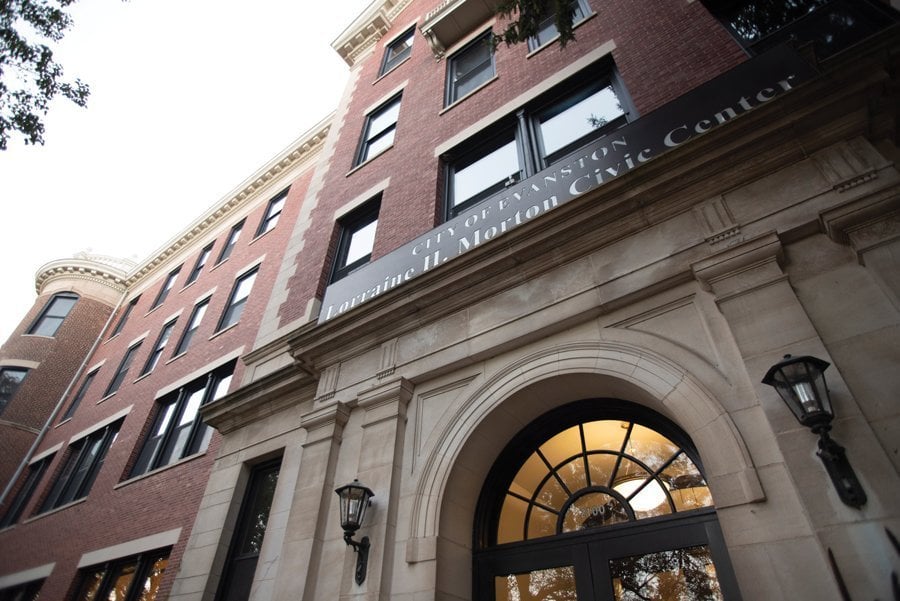City Council floats $867,500 youth services funding increase to support violence prevention programs
Daily File Photo by Colin Boyle
The Lorraine H. Morton Civic Center. City council members and residents discussed additional funding for community services and youth initiatives to address gun violence.
December 23, 2021
Content warning: This story contains mentions of gun violence.
Evanston may invest American Rescue Plan Act of 2021 funds into programs for at-risk youth.
During Monday’s special City Council meeting, councilmembers discussed proposals to allocate $867,500 in ARPA funding to the city’s youth services committee. The funds would expand Evanston’s “My City, Your City, Our City” program, which supports youth and families in developing violence prevention strategies and aids families impacted by violence.
The proposed funding increases come in the wake of two recent fatal shootings in Evanston and a nearly three-hour lockdown at Evanston Township High School last week after guns were found in two students’ backpacks.
Five Evanston youth between the ages of 14 and 24 were wounded by gun violence this year and four were fatally shot, according to the Evanston Police Department.
Former 5th Ward Ald. Delores Holmes said youth violence prevention has long been at the forefront of daily life in Evanston. She said she has seen multiple programs and community leaders engaged in creating solutions over the years.
“Violence is not a city, police, agency (or) family problem,” Holmes said. “It’s a community problem.”
Evanston’s Youth and Young Adult Division’s programming includes two after-school drop-in centers as well as specific violence prevention initiatives, such as life skills groups at Evanston/Skokie School District 65 schools. Residents can either refer themselves to these initiatives or be referred by other families, peers, teachers or police officers.
During the recent series of “My City, Your City, Our City” summer programming, the initiative supported block parties to foster community on specific streets in Evanston stigmatized as crime locations. The initiative also included summer drop-in centers to supplement the after school drop-in center at the Robert Crown Community Center. Summer drop-in spaces combined recreational programming, like painting and trips, with enrichment presentations on topics including financial literacy and teen dating violence.
The James B. Moran Center for Youth Advocacy sponsors many of the Youth and Young Adult Division’s programs, including one that aims to expunge minor offenses from youth’s records after participation in violence prevention education programming.
Patrick Keenan-Devlin, executive director at the Moran Center, urged the council to increase funding for programming that supports healthy family environments. He said the existing program has already proven effective in preventing systemic youth violence.
“The current crisis does not undermine our faith in long standing programming,” Keenan-Devlin said. “Rather, it should compel us to make greater investments in infrastructure and provide opportunities for system improvement based on evaluation and innovation.”
Audrey Thompson, the city’s community services manager, said additional funds for the “My City, Your City, Our City” initiative would be used to hire one new full-time staff member, a part-time middle school liaison, sponsor three violence prevention camps annually, and provide additional job search support for young adults.
Thompson said the program targets residents ages 14 to 24, but with the proposed increase, it will expand to residents ages 11 to 29.
Ald. Cicely Fleming (9th) said she hopes violence prevention efforts can soon be expanded into elementary schools as well. She said it’s important that violence prevention programming involves schools and families to create a larger environment in which young people feel accepted within the greater Evanston community.
“A lot of research talks about how you do to other people what you feel like someone has done to you, or you don’t feel like you kind of have a network in the community,” Fleming said. “That is definitely not a place that we should have kids walking around feeling like they’re not useful, but I know that has been somewhat experienced.”
Email: [email protected]
Twitter: @ilana_arougheti
Related Stories:
— How to donate to the families of two teenagers hospitalized after Evanston shooting
— ETHS lockdown concludes: 2 handguns found, 8 students detained


